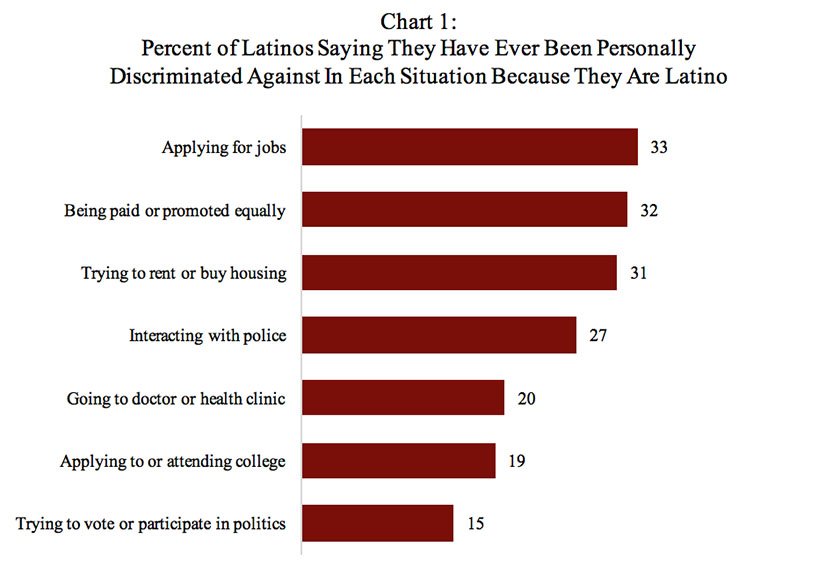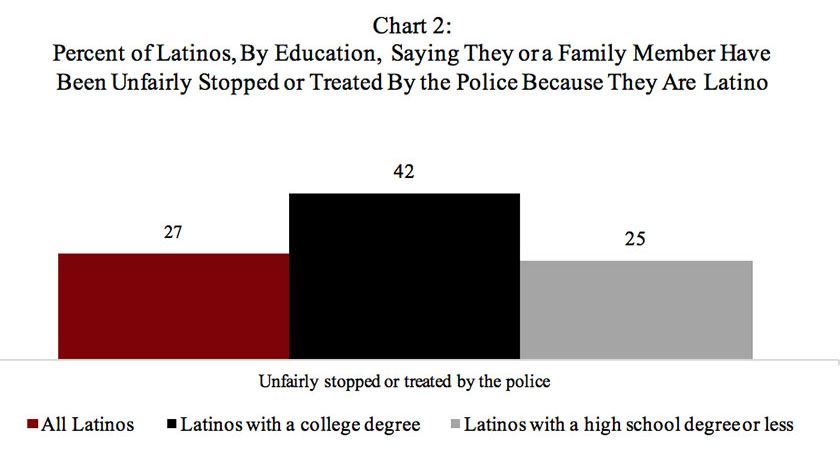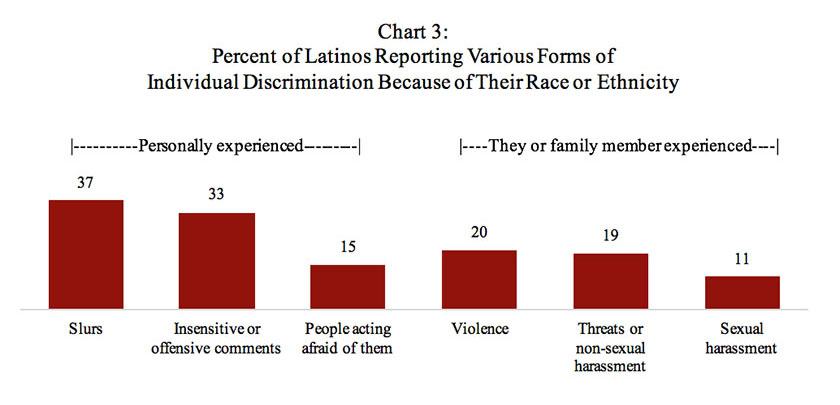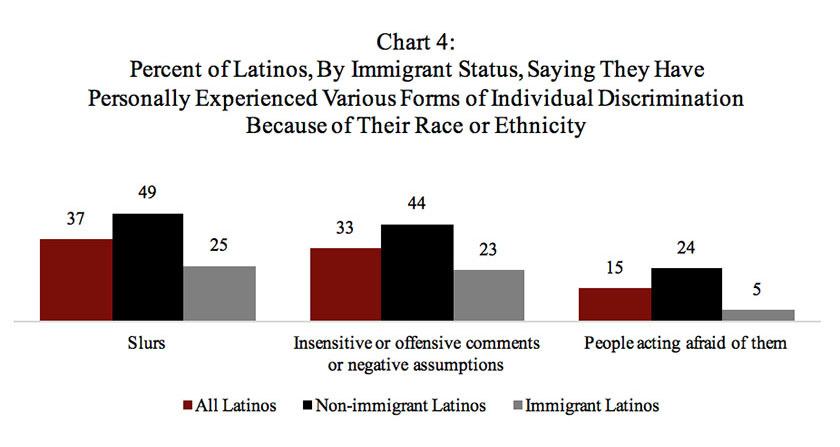Latinos with college degrees report more discriminatory experiences
For immediate release: November 1, 2017
Boston, MA – This report is part of a series titled “Discrimination in America.” The series is based on a survey conducted for National Public Radio, the Robert Wood Johnson Foundation, and Harvard T.H. Chan School of Public Health. While many surveys have explored Americans’ beliefs about discrimination, this survey asks people about their own personal experiences with discrimination.
Participants were not asked about their citizenship status. They were asked only whether they were born in the U.S., Puerto Rico, or in another country. This report refers to those born in the U.S. and Puerto Rico as non-immigrant Latinos, and to those born in another country as immigrant Latinos.
Roughly a third of Latinos report being personally discriminated against in the workplace and when seeking housing
In the context of institutional forms of discrimination, more than three in ten Latinos report having personally experienced discrimination because they are Latino when it comes to applying for jobs (33%), being paid equally or considered for promotion (32%), or when trying to rent a room or apartment or buy a house (31%) (Chart 1).

Over a quarter of Latinos say they or a family member have been unfairly stopped or treated by police because they are Latino; non-immigrant Latinos more likely to report this
Additionally, 27% of Latinos say that they or a family member have been unfairly stopped or treated by the police because they are Latino, and 20% say they or a family member have been treated unfairly by the courts because they are Latino.
Chart 2 shows that Latinos with a college degree are more likely (42%) than Latinos with a high school degree or less (25%) to report unfair police stops or treatment.
“Currently, there has been little media attention on issues directly affecting Latinos’ lives, particularly with regard to their jobs and housing. What is also lost is the considerable variation we see within the Latino community. For instance, Latinos with a college degree report more experiences of discrimination, including racial slurs and offensive comments and being unfairly treated by the police,” says Robert Blendon, Richard L. Menschel Professor of Health Policy and Political Analysis at Harvard T.H. Chan School of Public Health, who co-directed the survey.

Additionally, non-immigrant Latinos are nearly twice as likely (36%) as immigrant Latinos (19%) to say they or a family member have been unfairly stopped or treated by the police because they are Latino.
One third of Latinos have experienced racial or ethnic slurs and insensitive comments; one in five report violence or threats or non-sexual harassment
In the context of individual or interpersonal forms of discrimination, one third or more of Latinos say they have personally experienced people using racial or ethnic slurs against them (37%) or making insensitive or offensive comments about their race or ethnicity (33%) (Chart 3).

Additionally, one in five Latinos say that they or a family member have experienced violence (20%) or threats or non-sexual harassment (19%) because they are Latino (Chart 3).
Latinos with college degrees and non-immigrant Latinos more likely to report various experiences of individual discrimination
As with police treatment, Latinos with a college degree are significantly more likely than those with a high school degree or less to report experiencing a range of forms of individual discrimination, including slurs, insensitive or offensive comments, people acting afraid of them, or being threatened or harassed because they are Latino. For example, 54% of Latinos with a college degree say they have experienced racial or ethnic slurs, compared to 29% of Latinos with a high school degree or less.
Furthermore, Chart 4 shows that non-immigrant Latinos are more likely to report various forms of individual discrimination compared to immigrant Latinos. For example, nearly half (49%) of non-immigrant Latinos report experiencing slurs about their race or ethnicity, compared to 25% of immigrant Latinos.

in America: Experiences and Views of Latinos, January 26 – April 9, 2017. Q63a/Q64a, Q63b/Q64b, Q63c/Q64c. Each question asked of half-sample. Total N=803 Latino U.S. adults.
Similarly, 44% of non-immigrant Latinos report other people making insensitive or offensive comments about their race or ethnicity, compared to 23% of immigrant Latinos (Chart 4).
One in five Latinos have been personally discriminated against when seeking healthcare
In the context of healthcare, 20% of Latinos say they have been personally discriminated against because they are Latino when going to a doctor or health clinic (Chart 1). Additionally, 17% of Latinos say they have avoided seeking medical care for themselves or a member of their family out of concern they would be discriminated against or treated poorly because they are Latino.
Latinos divided over whether individuals’ prejudice or laws and government policies are the bigger problem for discrimination against Latinos today
Overall, 78% of Latinos believe that discrimination against Latinos exists in America today. Nearly half (47%) of those say that discrimination based on individuals’ prejudice is the larger problem, while 37% say discrimination based in laws and government policies is the larger problem. Another 14% say both forms of discrimination are equally a problem.
Survey Background
The survey was conducted January 26–April 9, 2017, among a nationally representative, probability-based telephone (cell and landline) sample of 3,453 adults age 18 or older. The survey included nationally representative samples of African Americans, Latinos, Asian Americans, Native Americans, as well as white Americans; men and women, and LGBTQ adults. This report presents the results specifically for a nationally representative probability sample of 803 Latino U.S. adults. Other reports analyze each other group, and the final report will discuss major highlights from the series.
For more information:
Todd Datz
617.432.8413
tdatz@hsph.harvard.edu
Visit the Harvard Chan School website for the latest news, press releases, and multimedia offerings.
###
Harvard T.H. Chan School of Public Health brings together dedicated experts from many disciplines to educate new generations of global health leaders and produce powerful ideas that improve the lives and health of people everywhere. As a community of leading scientists, educators, and students, we work together to take innovative ideas from the laboratory to people’s lives—not only making scientific breakthroughs, but also working to change individual behaviors, public policies, and health care practices. Each year, more than 400 faculty members at Harvard Chan School teach 1,000-plus full-time students from around the world and train thousands more through online and executive education courses. Founded in 1913 as the Harvard-MIT School of Health Officers, the School is recognized as America’s oldest professional training program in public health.
